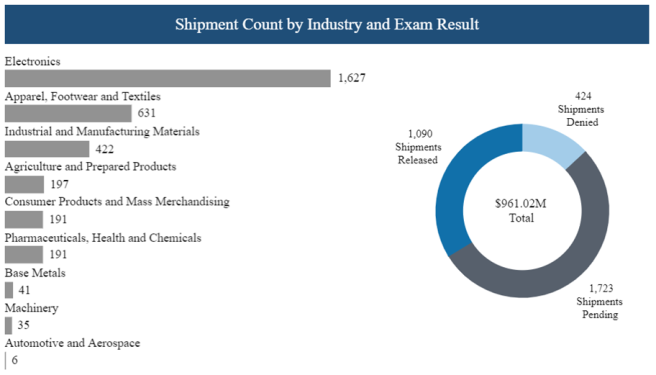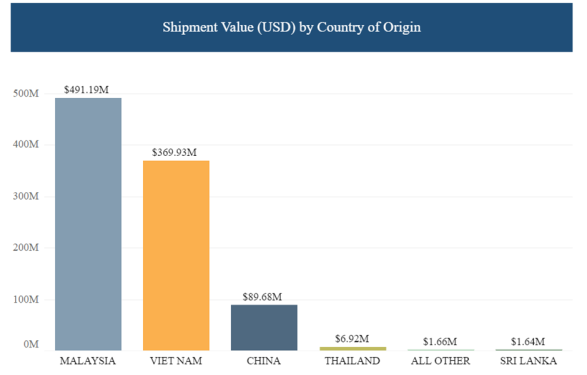More Than 3,000 Shipments Detained Under US Forced Labor Law: What You Need to Know
At least $960 million worth of imports were detained for suspected forced labor ties since last year, according to new data from the United States Customs and Border Protection (CBP).
Since the implementation of the Uyghur Forced Labor Prevention Act last year, more than 3,200 shipments to the US were detained at the border for suspected forced labor ties. More than 1,000 shipments were released but 424 were denied, according to CBP, and the remaining shipments are still under review.
Forced labor bans such as the UFLPA are continuing to spread globally and can have clear implications for businesses such as disruptions and reputational impact. However, these bans can also create opportunities for companies to promote ethical and sustainable sourcing practices and improve their overall social and environmental performance.

Latest figures released from the CBP of shipments detained under UFLPA. As of March 17, 2023.
Impact to Brands
The volume of detained shipments and the rising scrutiny for companies can wreak havoc for businesses. Most shipments detained by CBP were tied to the Electronics; Apparel, Footwear and Textiles; and Industrial and Manufacturing Materials industries, but all sectors are at risk.
The consequences for detained shipments range from lower sales, higher costs, investor concern, increased scrutiny by regulators and reputational damage. We have seen many household company names under fire in recent years as ties to forced labor were suspected and exposed within their supply chains, some experiencing financial loss and company shares falling in response.
Further due diligence to prevent these implications requires a step further to expand visibility over your sourcing regions.
Monitoring Sourcing Geographies
The CBP reported that $490 million worth of imports came from Malaysia, followed by $369 million from Vietnam and $89 million from China. Looking at data from our supply chain intelligence platform EiQ, where countries are given risk scores based on proprietary audit data and civil society data, we can see all three of these countries are given “High Risk” overall supply chain ESG scores.
When looking specifically at forced labor data, based on on-site audits and public domain data, Malaysia shows an “Extreme Risk” score in EiQ. As we go further in our data, EiQ’s adverse media-scanning tool Sentinel showed that at least 90 instances related to forced labor were picked up by various media channels in both China and Malaysia. These instances are related to various suppliers or companies in the respective countries that were picked up by local media channels, social media, search engines or government websites.
Although it is not always realistic or necessary for companies to stop operations in higher risk countries, gaining insight of the risk hotspots in their supply chains can allow for more effective supply chain segmentation. Understanding where there is higher risk allows responsible sourcing managers to better allocate resources and deploy capacity building measures for supplier remediation.

CBP data on the value of shipments detained under UFLPA by its country of origin.
What to Implement
This newly-released UFLPA data is a stark example of how detrimental the consequences can be for companies or brands found not in compliance with new legislation. Some best practices for responding to this rising forced labor bans and due diligence regulations include conducting regular risk assessments, knowing your suppliers, and monitoring and reporting on progress. Companies should conduct regular risk assessments to identify the potential ESG risks in their supply chain and ensure transparency when disclosing information about their practices, policies, and progress. This helps to build trust with stakeholders and demonstrate a commitment to responsible sourcing.
By implementing these best practices, companies can prevent the potential implications of detained shipments and supply chain disruptions.
These blogs are written by ELEVATE staff members or associates and the views and opinions expressed are not necessarily those of ELEVATE.
About the author
